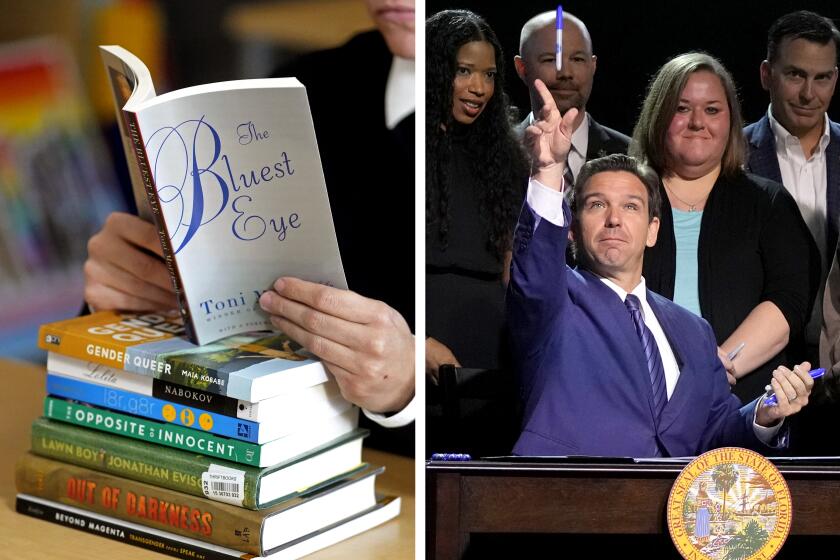Two Christian college employees used pronouns in their email signatures. Then they were fired

- Share via
Raegan Zelaya and Shua Wilmot thought the pronouns in their work email signatures would be a helpful identifier that could foster conversation and promote inclusivity, particularly at the small Christian university in New York where they worked.
But their good intentions ultimately cost them their jobs, Zelaya and Wilmot said in a video posted to YouTube last month.
For the record:
12:17 p.m. May 24, 2023A previous headline on this article identified the subjects of the story as college students. They were employees of Houghton University, not students.
Zelaya, who uses she/her, and Wilmot, who uses he/him, said Houghton University asked them to remove the pronouns from their signatures to align with an institutional policy introduced last fall to streamline email formats. Zelaya and Wilmot, neither of whom identifies as transgender, were terminated from their jobs as residence hall directors after refusing to remove the identifiers, they said.
A petition to protest their firings was signed by more than 700 alumni.
“Our overall concern is that these recent changes demonstrate a concerning pattern of failure on the part of the current administration to respect that faithful and active Christians reasonably hold a range of theological and ethical views, and in turn, failure to allow for genuine dialogue about these differing views,” the letter states.
Houghton spokesperson Michael Blankenship declined to comment on personnel matters, citing confidentiality, but said in an email that “Houghton University has never terminated an employment relationship based solely on the use of pronouns in staff email signatures.”
“Over the past years, we’ve required anything extraneous be removed from email signatures, including Scripture quotes,” he said.
Campuses around the country are fertile ground for the ongoing culture wars about gender identity, sexual orientation and social justice issues, particularly in red states where lawmakers and governors have been chipping away at transgender rights and restricting school curriculum. The issues have been especially fraught at Christian colleges, with institutions like Hillsdale College in Michigan seen as a beacon of conservatism against progressive and “leftist” ideology.
Unfounded claims about the Kinsey Institute’s work prompted the Indiana Legislature to block the flow of state dollars to the sex research institute.
Zelaya and Wilmot talked about their termination in a 50-minute video uploaded to YouTube the week they were fired. Sitting side by side and holding their termination letters in their hands, Zelaya and Wilmot explained that they added identifiers to their emails for practical purposes: Their uncommon first names often caused them to be misgendered in email correspondence, and they also recognized an industry-wide shift toward using identifiers in emails, at conventions or during job interviews.
The bigger pieces were deeper, they said. Using identifiers could foster conversations with students and others in the Houghton community, and they marked Zelaya and Wilmot as “safe people” on campus.
“I felt convicted to keep my pronouns in my email signature in the midst of the discrimination towards our queer students on campus, to mark myself as a safe person, so that I can continuously affirm how much our creator loves them and that there is room for them at the table and in the kingdom,” Zelaya wrote on her Facebook page.
A photo of a termination letter dated April 19 and uploaded to Zelaya’s Facebook page said she was fired “as a result of your refusal to remove pronouns in [your] email signature,” and for “false and defamatory statements” made against the college in the student newspaper, the Houghton Star. Zelaya had recently criticized a decision to close the campus’ multicultural center.
In the YouTube video, Wilmot said his termination also stated that he was fired because his email signature violated Houghton policy. His letter, a copy of which was shared with The Times, also stated he was fired for a follow-up email he sent in April to a top official at the Wesleyan Church, of which Houghton is a member, that administrators deemed threatening. (Neither Zelaya nor Wilmot was set to return to Houghton for the following academic year.)
According to the Wesleyan Church’s view of gender identity and expression explained on a church website, “gender differentiation is sacred,” and “gender confusion and dysphoria are ultimately the biological, psychological, social and spiritual consequences of the human race’s fallen condition.”
PEN America and publisher Penguin Random House filed a federal suit against Escambia County School District over its removal of books from school libraries.
In the YouTube video, Wilmot said he sent an email to the church’s general superintendent about revising its published views, which Wilmot said are “outdated and problematic,” and asked his letter be shared with the church’s board for consideration. In a follow-up email, Wilmot said he wrote that he “did not want to jump right to publishing it as an open letter” and “would appreciate” that his letter be shared with the church’s board members. “That was my threat, alleged threat,” Wilmot said in the video.
Zelaya could not be reached for further comment. In an Instagram message, Wilmot declined to speak further about his termination, saying only that he’d included his pronouns in his email signature since he created his account. “The expectation to remove them was not communicated until after I signed my contract for this academic year,” he wrote.
He also pointed to recent similar situations at other Christian colleges and universities, including an English professor at Taylor University in Indiana who said she was terminated because of her teachings on racial justice and a veteran professor at Palm Beach Atlantic University who said his contract was terminated early after a complaint that he was “indoctrinating” students by teaching about racial justice.
“The [Council for Christian Colleges & Universities] should collectively re-evaluate its priorities,” Wilmot wrote.
More to Read
Sign up for Essential California
The most important California stories and recommendations in your inbox every morning.
You may occasionally receive promotional content from the Los Angeles Times.













